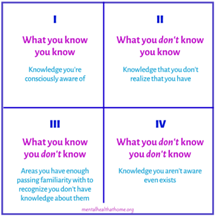
The Challenge of Finding Yourself While Caring for Your Autistic Child
Caring for an autistic child is a journey filled with love, challenges, and unique experiences. It requires immense dedication, patience, resilience, and love. However, amidst the daily routines, therapies, and advocacy, many parents find themselves struggling to maintain their sense of self. The challenge of finding yourself while caring for your autistic child is an issue we all face. It is rooted in the emotional, physical, and social dynamics of caregiving. Opening yourself up to opportunities to work with a coach to improve your understanding and uncover what you didn’t know you knew can help.
The following diagram from mentalhealthhome.org shows the four types of knowing. Coaching can help you uncover what you don’t know you know.

The Emotional Toll
The emotional landscape of raising an autistic child can be overwhelming. Parents often experience a range of emotions, from joy and pride in their child’s achievements to frustration and sorrow over the constant and ongoing challenges of advocating for our loved ones. These intense emotions can overshadow personal needs and aspirations. The constant vigilance required to manage dysregulation, sensory issues, anxiety, and communication barriers can lead to emotional exhaustion, making it difficult for parents to connect with their own identities outside of their caregiving role.
Physical Demands
The physical demands of caregiving are equally taxing. Many parents find themselves navigating a packed schedule of therapy sessions, medical appointments, and educational meetings. The physical act of caregiving—helping with daily activities, providing emotional support, and ensuring safety—can be draining. Often parents of autistic children don’t get the sleep they really need. The exhaustion from these responsibilities often leaves little energy for self-care or personal pursuits, further eroding the sense of self.
Social Isolation
Social isolation is another significant challenge. The unique needs of autistic children, and the judgement that parents can receive from others can make social outings and interactions stressful, leading many families to retreat from social activities. This isolation can extend to the parents, who may find it difficult to maintain friendships or engage in social activities. The feeling of being misunderstood or judged by others can also contribute to withdrawing from social circles. This lack of social support can exacerbate feelings of loneliness and disconnection from one’s identity.
Finding Balance
Despite these challenges, finding yourself while caring for an autistic child is possible and crucial for both the parent and the child’s well-being. Here are some strategies to help reclaim your sense of self:
Prioritize Self-Care: Even short moments of self-care can make a significant difference. Whether it’s a few minutes of meditation, a walk, reading a book, or just sitting in the sun with a coffee, these activities can help recharge your emotional and physical energy.
Seek Support/Find your people: Connecting with other parents of autistic children through support groups, online forums, or local organisations can provide a sense of community and shared understanding. Professional counselling or coaching sessions can also offer a space to process emotions and develop coping strategies.
Delegate Responsibilities: Don’t hesitate to ask for help from family, friends, or professional caregivers. Delegating some care-giving tasks can free up time for you to engage in activities that nurture your identity. Likewise, getting assistance with the everyday chores can free up time for you to recharge.
Set Realistic Goals: Accept that finding a balance will take time and that it’s okay to set small, achievable goals. Celebrate small victories, whether it’s finding time for a hobby or reconnecting with a friend. Again, counselling or coaching can help to bring things into perspective and find the good in situations.
Communicate: Openly communicate with your partner, family, or close friends about your needs and feelings. Building a support network is essential for maintaining your well-being.
Conclusion
Caring for an autistic child is a journey that reshapes your life in profound ways. While it can be challenging, the capacity for growth, resilience, and deep, unconditional love are enormous. By prioritizing self-care and seeking support, parents can begin to reclaim their sense of self, finding a balance that honours both their own identity and their essential role as caregivers.
Coaching can provide a way of opening your conscious to ways of supporting yourself and your loved ones that you hadn’t thought of. It can bring awareness to what is important to you and help you identify positive steps towards finding yourself.

